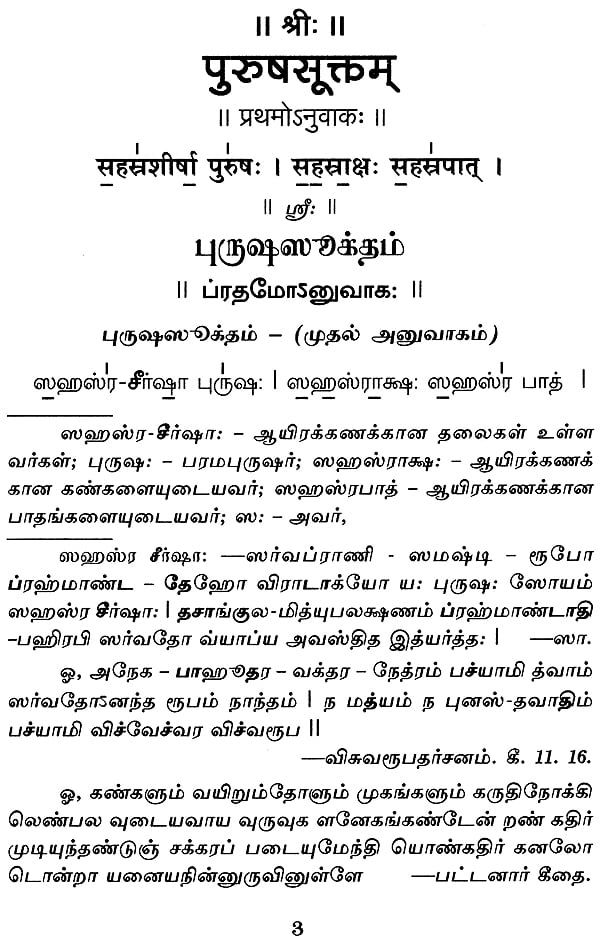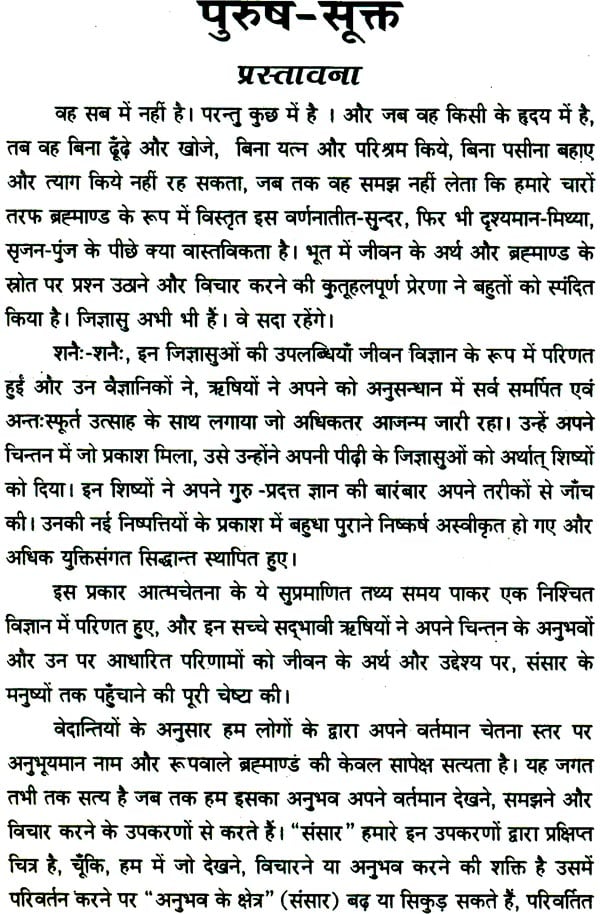Sri Sukta & Sri Mahalaxmi Stuti
Darshan of Sri AshthaLakshmi Maa in AshthaLakshmi Bhavan atSivananda Ashram, Ahmedabad
Oct 16, 2019 The Purusha Sukta. The Purusha Sukta is a most commonly used Vedic Sanskrit hymn. It is recited in almost all Vedic rituals and ceremonies. It is often used during the worship of the Deity of Vishnu or Narayana in the temple, installation and fire ceremonies, or during the daily recitation of Sanskrit literature or for one’s meditation. Shree Swami Samartha - Purusha Suktam. The Purusha Sukta is the most famous and likely one of the most important hymns from the Rigveda. It is called a 'later' Vedic hymn because its grammar is not as difficult as hymns in the other parts of the Rigveda; however, the language of the Purusha Sukta has some features that don't appear in later Sanskrit works, including Vedic accent.
SRI SUKTA


(HYMNTO THE DIVINE MOTHER IN THE FORM OF LAKSHMI)

TRANSLATIONBY SRI SWAMI KRISHNANANDA
(1-2)Invoke for you O Agni, the Goddess Lakshmi, who shines like gold, yellow in hue,wearing gold and silver garlands, blooming like the moon, the embodiment ofwealth. O Agni! Invoke for me that unfailing Lakshmi, blessed by whom, I shallwin wealth, cattle, horses and men.
(3-4) I invoke Shri (Lakshmi, who has a line of horses in her front, a series of chariots in the middle, who is being awakened by the trumpeting of elephants, who is divinely resplendent. May that divine Lakshmi grace me. I hereby invoke that Shri (Lakshmi) who is the embodiment of absolute bliss; who is of pleasant smile on her face; whose lustre is that of burnished gold; who is wet as it were, (just from the milky ocean) who is blazing with splendour, and is the embodiment of the fulfillment of all wishes; who satisfies the desire of her votaries; who is seated on the lotus and is beautiful like the lotus.
(5-6)I resort to that Lakshmi for shelter in this world, who is beautiful like themoon, who shines bright, who is blazing with renown, which is adored (even) bythe gods, which is highly magnanimous, and grand like the lotus. May mymisfortunes perish. I surrender myself to Thee, O Thou resplendent like the Sun!By Thy power and glory, plants like the bael tree have grown up. may the fruitsthereof destroy through the grace of all inauspiciousness rising from the innerorgans and ignorance as well from the outer senses.
(7-8) O Lakshmi! I am born in this country with the heritage of wealth. May the friends of Lord Siva (Kubera, Lord of wealth and Kiriti, Lord of Fame), come to me. May these (having take their abode with me), bestow on me fame and prosperity. I shall destroy the elder sister to Lakshmi, the embodiment of inauspiciousness and such evil as hunger, thirst and the like. O Lakshmi! Drive out from my abode all misfortunes and poverty.
(9-10)I hereby invoke Lakshmi (Shri), whose (main) avenue of perception is theodoriferous sense (i.e., one who abides mainly in cows); who is incapable ofdefeat or threat from anyone; who is ever healthy (with such virtuous qualitiesas truth); whose grace is seen abundantly in the refuse of cows (the cows beingsacred); and who is supreme over all created beings. O Lakshmi! May we obtainand enjoy the fulfillment of our desires and our volitions, the veracity of ourspeech, the wealth of cattle, the abundance of varieties of food to eat! Mayprosperity and fame reside in me (thy devotee)!
(11-12) Lakshmi! You have progeny in Kardama. (Hence) O Kardama, may you reside in me. Make Mother Shri with garlands of lotuses to have Her abode in my (ancestral) line. may the (holy) waters create friendship (they being of adhesive nature). O Chiklita (progeny of Shri)! Reside at my home; and arrange to make Divine Mother Shri stay in my lineage!
(13-14)Invoke for me, O Agni, Lakshmi who shines like gold, is brilliant like the sun,who is powerfully fragrant, who wields the rod of suzerainty, who is the form ofsupreme rulership, who is radiant with ornaments and is the goddess of wealth.Invoke for me O Agni, the Goddess Lakshmi who shines like gold, blooms like themoon, who is fresh with anointment (of fragrant scent), who is adorned with thelotuses (lifted up by celestial elephants in the act of worship), who is thepresiding deity of nourishment, who is yellow in colour, and who wearsgarlands of lotuses.
Invoke for me O Agni, that Goddess Lakshmi, who is ever unfailing, being blesses by whom I shall win wealth in plenty, cattle, servants, horses and men.
Wecommune ourselves with the Great Goddess, and meditate on the consort of Vishnu;may that Lakshmi direct us (to the Great Goal). Om May there be Peace, Peace,Peace.
Latest Additions.........
Sivananda Yoga (Yoga DVD) Diwali Prasad booklet - 'Kanakdhara Stotram' ( Sanskrit/ Gujarati/ English) Divya Jivan (Gujarati)/'Amrut Putra'(Gujarati) Atam Mahek (Gujarati) / Fragrance ( English) - Swami Adhyatmananda | Yoga, A Way of Life - Sri Swami Adhyatmananda 'Yoga and Health' - a complete book with Question & Answer section by Sri Swami Adhyatmananda |
Please subscribe to Divyajivan Mailing List. We will update you with new uploads of spiritual literature on the web of Holy Master Sri Swami Sivanandaji Maharaj, saints of his lineage and other saints. We will also update you about the Sivananda Ashram, Ahmedabad website and facilitate communication with Sri Swami Adhyatmanandaji Maharaj. |
To manage your subscription, please visit Subscription Page. You can also subscribe and unsubscribe from this page. You may unsubscribe by yourself anytime you wish. You will be required to send confirmation link that you will get in your e-mail to complete this subscription. |
Introduction
- In Hinduism
- In Buddhism
- Languages
Introduction:
Purusha-sukta means something in Buddhism, Pali, Hinduism, Sanskrit. If you want to know the exact meaning, history, etymology or English translation of this term then check out the descriptions on this page. Add your comment or reference to a book if you want to contribute to this summary article.
The Sanskrit term Puruṣasūkta can be transliterated into English as Purusasukta or Purushasukta, using the IAST transliteration scheme (?).
Purusha Suktam In Sanskrit
In Hinduism
Purana and Itihasa (epic history)
Puruṣasūkta (पुरुषसूक्त) is the name of a mantra that is chanted during Dhārāpūjā, according to the Śivapurāṇa 2.1.14:—“ after performing the regular worship of Śiva, with great devotion in accordance with prescribed rules, the devotees shall pour water in a continuous stream (jaladhārā). This Dhārā worship [viz., Dhārāpūjā] is very efficacious in delirium due to fever (jvarapralāpa). At that time [...] Puruṣasūkta, [... etc.,] shall be repeated. The Dhārā worship [viz., Dhārāpūjā] is very excellent in regard to flourishing series of pleasures. [...]”.
Purusha Suktam Sanskrit English
Source: Cologne Digital Sanskrit Dictionaries: The Purana IndexPurusha Suktam Sanskrit Pdf
Puruṣasūkta (पुरुषसूक्त).—Brahmā praised Hari by this;1 to be uttered while installing a new image.2
- 1) Bhāgavata-purāṇa X. 1. 20; Brahmāṇḍa-purāṇa IV. 43. 12.
- 2) Matsya-purāṇa 265. 26.
The Purana (पुराण, purāṇas) refers to Sanskrit literature preserving ancient India’s vast cultural history, including historical legends, religious ceremonies, various arts and sciences. The eighteen mahapuranas total over 400,000 shlokas (metrical couplets) and date to at least several centuries BCE.